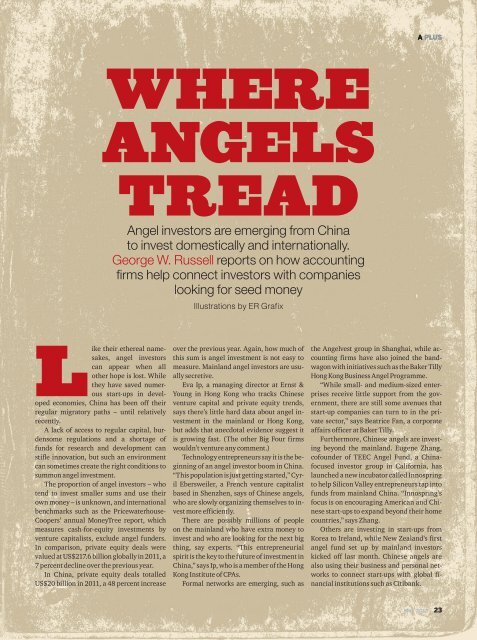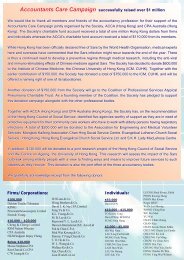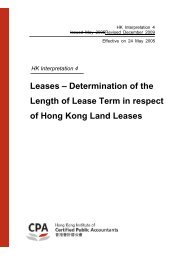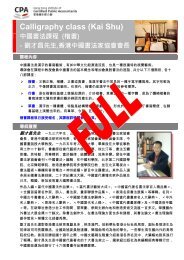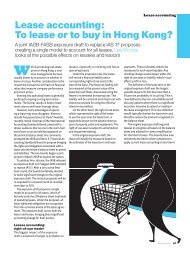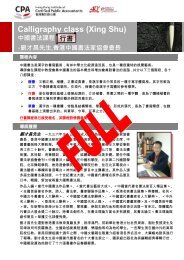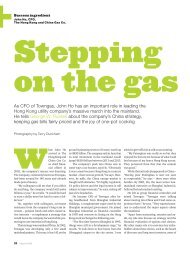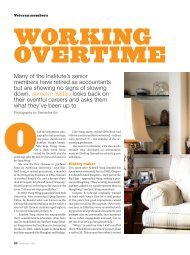Flagship fashion - Hong Kong Institute of Certified Public Accountants
Flagship fashion - Hong Kong Institute of Certified Public Accountants
Flagship fashion - Hong Kong Institute of Certified Public Accountants
You also want an ePaper? Increase the reach of your titles
YUMPU automatically turns print PDFs into web optimized ePapers that Google loves.
Like their ethereal namesakes,<br />
angel investors<br />
can appear when all<br />
other hope is lost. While<br />
they have saved numerous<br />
start-ups in developed<br />
economies, China has been <strong>of</strong>f their<br />
regular migratory paths – until relatively<br />
recently.<br />
A lack <strong>of</strong> access to regular capital, burdensome<br />
regulations and a shortage <strong>of</strong><br />
funds for research and development can<br />
stifle innovation, but such an environment<br />
can sometimes create the right conditions to<br />
summon angel investment.<br />
The proportion <strong>of</strong> angel investors – who<br />
tend to invest smaller sums and use their<br />
own money – is unknown, and international<br />
benchmarks such as the Pricewaterhouse-<br />
Coopers’ annual MoneyTree report, which<br />
measures cash-for-equity investments by<br />
venture capitalists, exclude angel funders.<br />
In comparison, private equity deals were<br />
valued at US$217.6 billion globally in 2011, a<br />
7 percent decline over the previous year.<br />
In China, private equity deals totalled<br />
US$20 billion in 2011, a 48 percent increase<br />
WHERE<br />
ANGELS<br />
TREAD<br />
Angel investors are emerging from China<br />
to invest domestically and internationally.<br />
George W. Russell reports on how accounting<br />
firms help connect investors with companies<br />
looking for seed money<br />
Illustrations by ER Grafix<br />
over the previous year. Again, how much <strong>of</strong><br />
this sum is angel investment is not easy to<br />
measure. Mainland angel investors are usually<br />
secretive.<br />
Eva Ip, a managing director at Ernst &<br />
Young in <strong>Hong</strong> <strong>Kong</strong> who tracks Chinese<br />
venture capital and private equity trends,<br />
says there’s little hard data about angel investment<br />
in the mainland or <strong>Hong</strong> <strong>Kong</strong>,<br />
but adds that anecdotal evidence suggest it<br />
is growing fast. (The other Big Four firms<br />
wouldn’t venture any comment.)<br />
Technology entrepreneurs say it is the beginning<br />
<strong>of</strong> an angel investor boom in China.<br />
“This population is just getting started,” Cyril<br />
Ebersweiler, a French venture capitalist<br />
based in Shenzhen, says <strong>of</strong> Chinese angels,<br />
who are slowly organizing themselves to invest<br />
more efficiently.<br />
There are possibly millions <strong>of</strong> people<br />
on the mainland who have extra money to<br />
invest and who are looking for the next big<br />
thing, say experts. “This entrepreneurial<br />
spirit is the key to the future <strong>of</strong> investment in<br />
China,” says Ip, who is a member <strong>of</strong> the <strong>Hong</strong><br />
<strong>Kong</strong> <strong>Institute</strong> <strong>of</strong> CPAs.<br />
Formal networks are emerging, such as<br />
the Angelvest group in Shanghai, while accounting<br />
firms have also joined the bandwagon<br />
with initiatives such as the Baker Tilly<br />
<strong>Hong</strong> <strong>Kong</strong> Business Angel Programme.<br />
“While small- and medium-sized enterprises<br />
receive little support from the government,<br />
there are still some avenues that<br />
start-up companies can turn to in the private<br />
sector,” says Beatrice Fan, a corporate<br />
affairs <strong>of</strong>ficer at Baker Tilly.<br />
Furthermore, Chinese angels are investing<br />
beyond the mainland. Eugene Zhang,<br />
c<strong>of</strong>ounder <strong>of</strong> TEEC Angel Fund, a Chinafocused<br />
investor group in California, has<br />
launched a new incubator called Innospring<br />
to help Silicon Valley entrepreneurs tap into<br />
funds from mainland China. “Innospring’s<br />
focus is on encouraging American and Chinese<br />
start-ups to expand beyond their home<br />
countries,” says Zhang.<br />
Others are investing in start-ups from<br />
Korea to Ireland, while New Zealand’s first<br />
angel fund set up by mainland investors<br />
kicked <strong>of</strong>f last month. Chinese angels are<br />
also using their business and personal networks<br />
to connect start-ups with global financial<br />
institutions such as Citibank.<br />
May 2012 23


